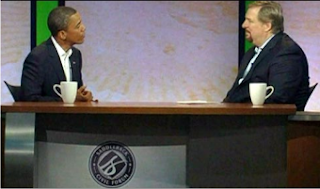 Blago Tries to Box In Reid, Dennis Byrne, Real Clear Politics, December 31, 2008.
Blago Tries to Box In Reid, Dennis Byrne, Real Clear Politics, December 31, 2008.Anyone willing to accept Gov. Rod Blagojevich's appointment as Illinois' U.S. senator should be considered too stupid to hold the job. Incredibly, the besieged governor actually found someone crazy enough to agree to fill President-elect Barack Obama's vacated senate seat. That person is Roland Burris, a lifelong creature of smarmy state and local Democratic politics, a former one-term state attorney general and three-term state comptroller.
Although Burris was elected to those offices several times by comfortable majorities, he had failed in recent attempts at higher office, as governor (running unsuccessfully in a three-way primary against Blagojevich) and as mayor of Chicago. (Yes, in Illinois, mayor of Chicago is considered the highest of all offices, save the presidency.) Burris had been fading into obscurity, running a consultancy that certified minority contractors and handled government bond issues, plums much more cherished and traditional for party loyalists here than the standard gold watch. Burris was no longer considered a player and had not been on the governor's list of possible appointees prior to his arrest.
Only a man with deep personal cravings could have blinded himself to ridiculousness of the course he has chosen. Senate President Harry Reid, in an unusual statement issued even before the governor announced the appointment, flatly said the body would not confirm anyone appointed by Blagojevich, and mentioned Burris by name. Also, before the appointment was announced, Illinois Sec. of State Jessie White also issued a statement saying that he would not certify the Burris appointment. A few have questioned whether Reid and White had the legal authority to exclude Burris from the Senate, but the cloud hanging over the entire affair is dark and heavy, whatever the legal implications.
Blagojevich and Rep. Bobby Rush (D-Ill.), who showed up at the announcement press conference, praised Burris' "fine record of public service," although my own view is that just getting through a political career here without the usual political taint qualifies as the finest of records. Burris accepted the accolades without seeming to understand the irony. But Rush aptly demonstrated the cynicism of Blagojevich's action by brandishing the blunt weapon of racism. Rush, an African American, warned that a senate that refused to seat Burris, an African American, would be engaging in a "hanging" and "lynching." Even by Chicago political standards, the deployment of those inflammatory words was an extraordinarily slimy racist play.
But that's Chicago for you. By appointing a black man, Blagojevich figured that he would put Reid in the hot seat by forcing him to shut out the only African American in the Senate. And it was a challenge to White, also an African American and a quite popular one at that, who would find himself explaining why he was blocking the Senate's only black member. Blagojevich, as is his habit, might have miscalculated. Reid's letter to the governor was remarkably strong, and all Senate Democrats signed an earlier one warning him not to appoint anyone. Whatever becomes of it, however, Blagojevich's gambit should produce some interesting results, especially if Democrats are willing to stand up to one of their main constituencies by "denying" the seat to Burris. I can just hear Blagojevich telling Reid, "Threaten me, will you? How do you like the box that I'm putting you in."
Now, if you think this whole affair had been scripted for the theater of the absurd, you'd be right. Absurd is how Illinois and Chicago politics works. And we have one of the worst governed, most financially troubled states in the nation to prove it--a state, it should be noted--run entirely by Democrats. You can be forgiven if you think that what we witnessed with the appointment is the result of one man's pathology, and surely not every pol in the state could be that stupid, insane or destructive. But you'd be wrong. What unfolded on Tuesday is characteristic of how politics here is played. Anyone, including David Axelrod and Rahm Emanuel, who are among Obama's top advisors, are capable of the same kind of goofiness and hardball.
By now, is there a single Obama supporter anywhere who fails to understand why some of us here were so concerned about him in the White House with his Chicago outfit?
Dennis Byrne is a Chicago Tribune op-ed columnist. dennis@dennisbyrne.net.
Text Source: Real Clear Politics
Image Source: Obama and Mayor Daley, Los Angles Times







